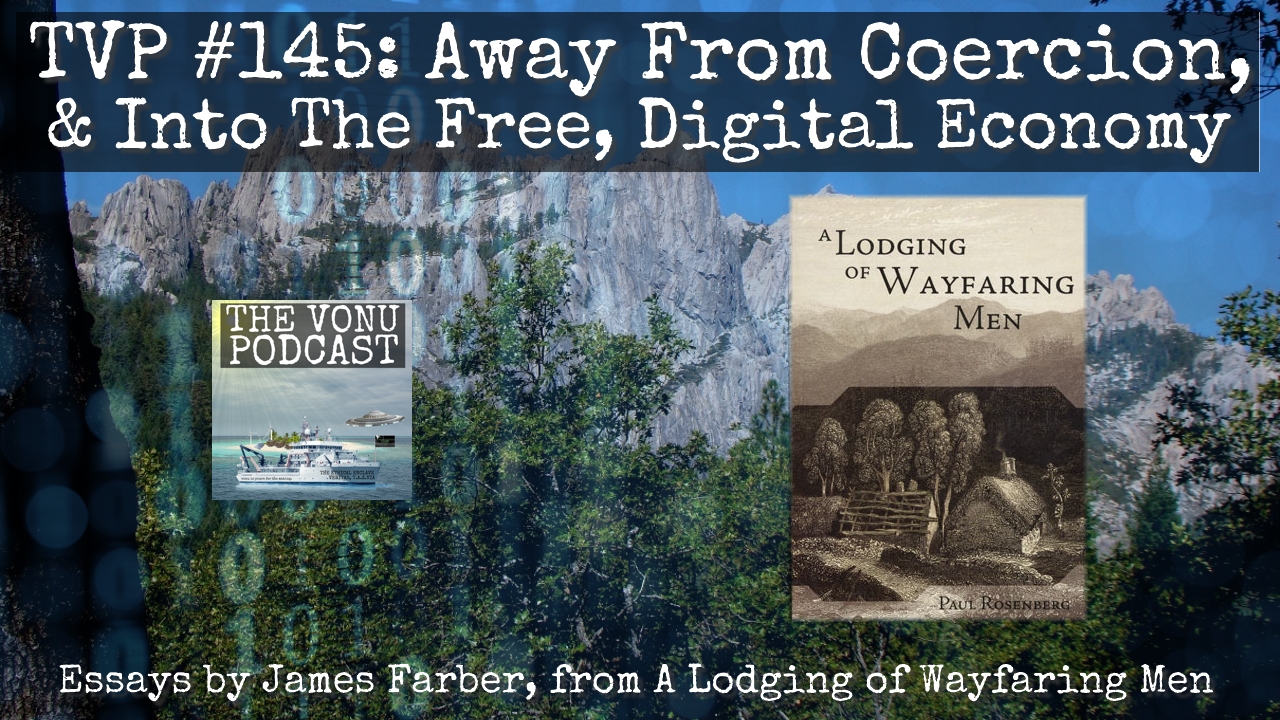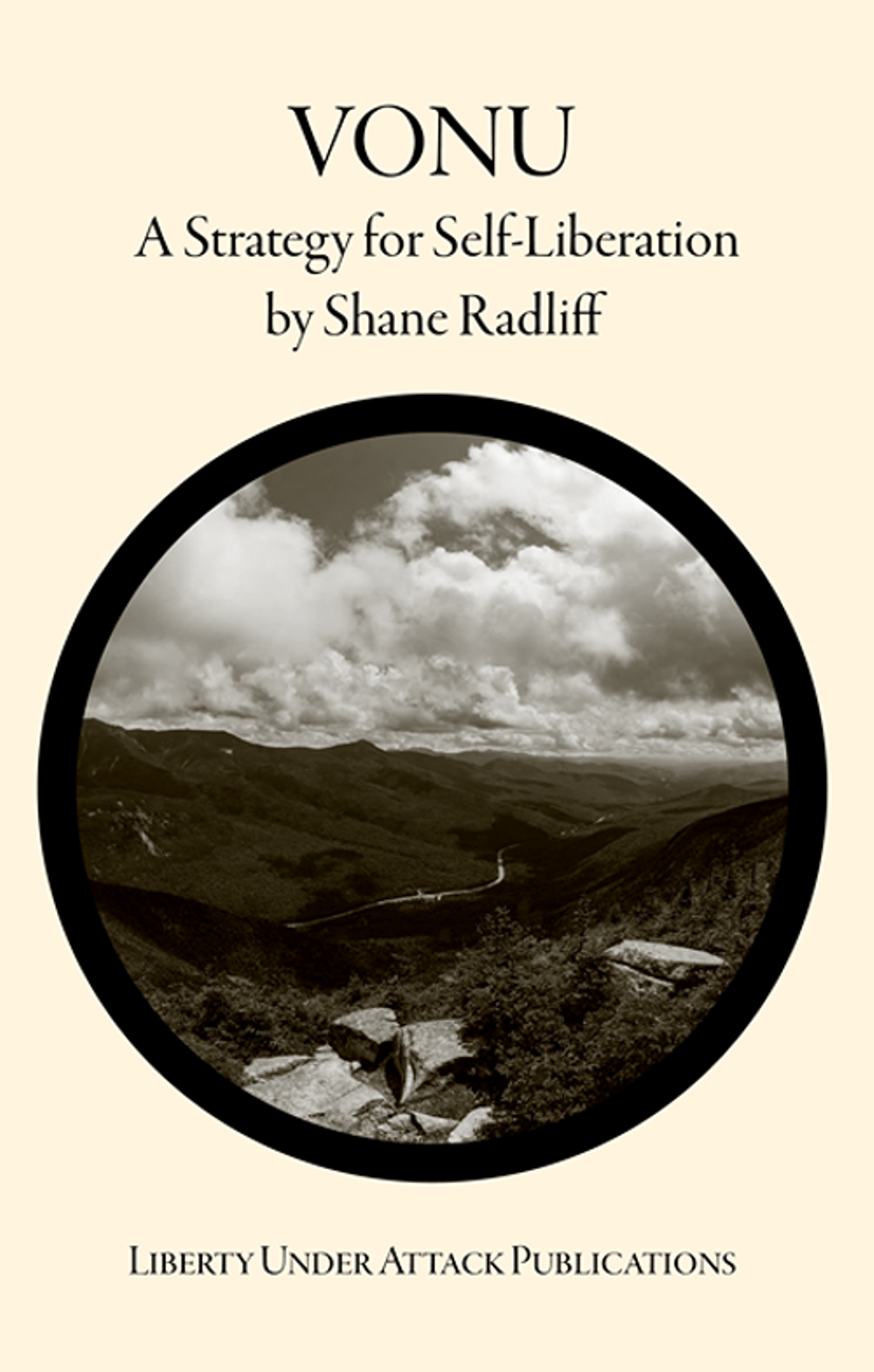Podcast: Play in new window | Download
Subscribe: Apple Podcasts | Android | Email | Google Podcasts | Stitcher | TuneIn | Spotify | RSS
The following are two essays from Paul Rosenberg’s fiction book titled, A Lodging of Wayfaring Men, which I highly recommend every vonuan/anarchist/crypto-agorist read.

Herein, James Farber, one of the main characters, published an opinion piece in the New York Times discussing the problem of coercion, the negative impact it has on society, the detrimental effect it has on human creativity and innovation, and a request to folks in the statist-servile society:
“We don’t want to change your systems–we just want to be left alone.”
The time for the Free Digital (& Physical) Economy is now.
[/BEGINNING EXCERPTS]
JAMES FARBER’S FIRST ESSAY
It began with Arab traders and the merchants of Venice. They really didn’t know what they were building or how it would work. They merely struggled for the betterment of themselves and their families.
It began to break out when the deep superstition of the middle ages cracked open under the strain of new philosophies and religious ideas.
It found room to grow wherever new and wild vistas were found. It found fresh growth with each discovery of far-off new lands. It found a home everywhere the old order was broken up and fresh starts were being made. It took a firm root in America and flourished there for over a hundred years.
Never again, where history is recorded, will there be any question as to whether or not it works.
“It,” is the great discovery of the modern era: the positive-sum game. It is the liberation of human energy to do its appropriate job. It is the operation of creation, using the only counter-entropic force we have: free human energy.
You can see it work everywhere from the research lab, to the front office, to the construction site. It is what drives the entrepreneur to develop and produce a new product or service, and it is what gives the construction worker pride when his skill overcomes a difficult problem, making a way for his blueprints to become a functional structure. Why is the construction worker proud, and why does the entrepreneur exult? Because they have done the one thing that all humans have the impulse to do – to create something good that would not have been otherwise. Human energy is the great creative force in the world. Without it, things tend to entropy. (As the second law of thermodynamics states, “closed systems tend to entropy.”) Without active and creative human energy, everything goes back to an animal level of existence.
This human energy does not function by obedience and compulsion – it cannot, no matter how many rulers wish it were otherwise. Look at the command economies of the dead socialist world. Within several decades their occupants were reduced to an animal existence. Look at the millennia when constrained people lived at the pleasure of their Kings, seeking permissions from their rulers to live and work. They continually starved and died. It was only when a few freelance merchants began living according to their own minds and breaking away from the permissions of their rulers that things began to change.
When human energy is free to move, creativity goes wild; as do motivation, happiness, and the accumulation of wealth. When it is restrained, the descent to animal existence takes over again.
The discovery of this fact is what differentiates us from the middle ages, and not much else. Do you think the people who lived in those dark times were inherently less intelligent than we are? They were not! You and I are their direct descendants, not many generations removed. We are essentially the same.
The term positive-sum game signifies that this system creates more than the sum of its parts. The only real magic – human energy – creates more than it started with. Take some raw materials that are of themselves are of little worth; and when you add human creativity you can create vehicles, computers, and space ships. The materials themselves have been around since the creation of the earth, if they could have turned into something great of themselves they would have done it long ago. But they cannot – it is only when humans manipulate them according to their own ideas that they gain any value. Thus, five dollars worth of materials becomes a product worth thousands of dollars.
They who do not play the positive-sum game instinctively fall back into being motivated by envy. Ultimately, they find reasons to feel that “there are only so many pieces of the pie.” This is the seed of destruction.
The next thing they say is “if you have a bigger piece of the pie, then someone else has to have less.” That is a zero-sum game – the idea that nothing is really created, just moved from one hand to another. Not only is it false, but it is also the credo of every envious looter who speaks of ‘fairness’ and ‘equal distribution of wealth,’ but who secretly hopes to get a share of wealth held by others.
The real controversy of our time is this: Is human energy allowed to work in the world, or will it be tied down? The miserable experiment of communism has taught the world’s rulers that the positive-sum game is necessary. So, their plan now is to allow human energy to work, but to siphon off as much wealth as possible without killing it all together. We productive people are carrying the governments of the world upon our backs.
Are they worth half of our efforts – half of our lives?
They take half of our earnings away from us continually by a vast web of taxes, fees and regulations – for what benefit? “To help the poor,” they say, and clamorously infer that if you disagree you are a heartless and dangerous person, and further that all will despise you. But if our money is forcibly taken from us, is not the state robbing us? Any dictionary will tell you that this is so, but it is considered poor form to say so – even to consider it.
And are the poor better off? Certainly some of our money goes to the poor (although most is eaten up in the bureaucracy). This feeds their bellies insufficiently, while at the same time locking them into a life of dependance that wages an unending war upon their souls. Is that a good thing? Are the poor better off for this robbing of producers and living in a state of dependency?
Many of you will gasp, and reel in shock that I would challenge the respectability and honor of your tradition, and you fear to let yourselves consider my case. You have come up against someone who does not share in your conspiracy of compliance. You must either turn away from these subjects, or face the prospect of becoming a radical, and of people saying bad things about you.
Are you angry? If so, it is not because I am wrong. If that were the case, you would simply walk away. You are angry because I am ill-mannered enough to bring up subjects that you wish to avoid. My ideas bother you. When they come up, you divert your mind to pat phrases like “that is the price we pay for our society.” You dodge reason, and shunt your thoughts away in order to keep your mental comfort level. You do not face these ideas head-on because you are afraid of them – you are afraid that you might have to agree with them. And then you would have to face the choice either to be a hero or to be a coward.
I stood one evening in IBM Plaza in Chicago, looking over the river-front skyline as the sun sank in the southwest, and realized that the towering monuments to human effort in front of me were the results of the positive sum game run at only half-speed. Chicago was wild and open from the 1830s through the 1890s. Then, slowly, the curbs and limits were imposed by do-gooder government and collectivist types. These inevitably slowed the workings of a city that had been, as one writer said, ‘geared for giants.’ But the restraints were not enough to stop the positive-sum game – only enough to slow it down.
The Chicago skyline I watched was the result of the positive-sum game being played at half-speed, yet its results were awesome. I thought about what might have been if it were allowed to operate unfettered. And then I thought of the greatest example of the positive-sum gave during my lifetime – Hong Kong. It went from rice fields to the grandest city of the east in one generation – an explosion of unrestrained human energy.
What things we have been deprived of! What glorious accomplishments aborted and still-born! And now our recent explosion of technology has become the target of bureaucrats world-wide. Where will we go from here? Will the positive-sum game once again be strangled, or will it migrate to new and open lands?
But! Moving to a new land will be a problem, won’t it? There is no land on this planet that is not claimed by some gang of rulers. So, until cheap space flight is achieved, there is only one new country to be found – cyberspace. So escape there we shall. And there we will – and must, for our own sake and for the sake of our descendants – establish the positive-sum game without restriction.
Toward that end, we have built a private free market. We used our own money to do it, and we’ve broken no laws that we are aware of, save laws that outlaw privacy. Now, the rulers are trying to stop us. Why? We want to run an experiment, and see if freedom really is better than servitude. Why won’t they let us try? Are they interested in the betterment of mankind, or are they really interested in monopoly powers? All we want is to be left alone and to try freedom. Why is that threatening? And why do they wish to imprison us?
-James Farber
JAMES FARBER’S SECOND ESSAY
History books tell the stories of Rulers. Some are Kings; some, Emperors; some, Presidents or Prime Ministers; and some, potentates of more exotic name. A few of them were more or less benevolent, and others were tyrants. Most were in-between. But they all held one thing in common – they maintained a monopoly on the use of force in their territories. They maintained their right to use coercion, and to prevent all others from doing so.
Stripped of romantic rhetoric and patriotic emotion, the essence of rulership is the ability maintain a monopoly of force. Argue if you like, but you will be arguing with the dictionary.
Every reform of government and rulership to date has kept the central mechanism of coercion in place. Did some governmental reforms lead to improvements? Certainly. They made things considerably less bad. But they left centralized coercion in place. And for every ‘good’ leader that has come along, such as a Washington or a Churchill, we’ve had several times as many Stalins or Maos.
I have friends who study such things, and they assure me that roughly two percent of all people are would-be dictators; if they had the opportunity to oppress the world, they would. Another twelve percent or so are would-be facilitators; that is, when one of the two-percenters comes to power, they are glad to fill a slot and vigorously exercise power over others. Like it or not, these people are out there, and they are drawn to the levers of power. And once every so often, they have their turns. When they do, innocent people die in large numbers. Over one hundred million died this way in the past century. Try to comprehend that… one hundred times one thousand, times one thousand people. Boys, girls, men, women, teenagers, short, tall, strong, weak, dark-skinned, and light-skinned. All of them dead because twisted people were able to take hold of centralized force.
If you have wondered why some of us are so determined to keep governments out of cyberspace, please understand that this is why. We’ve had enough of centralized force. We’re removing the whole mechanism. We think it was a mistake from the beginning. We don’t want there to be anything for the two percent to grab.
If you want coercive rulership, keep it; we won’t try to take it away from you. But we have chosen to opt out. Don’t try to reign us back in. We won’t try to make you live our way, and you don’t try to make us live your way. We are not your property.
Our arrangement has no central mechanism of coercion, and it has been working quite well for a couple of years now. We like it.
This new arrangement has, however, surprised us in several ways. One of the things we discovered was that once you remove the mechanisms of coercion, you remove something else – politics. Politics is the art and science of managing centralized coercion. This is the reason political debates are so infuriating: the final decision leads to unopposable force. Once the political process is completed, you have the choice either to obey, or to be punished.
Coercion is the sine qua non of politics; the thing, without which, politics would not be politics. Indeed, if you remove coercion, politics becomes something else – economics.
Things work by economic means here. If you don’t like the way a market operates, just move to a different one. Or, if no one does it the way you think is right, start your own. There are no protected services here, nothing mandatory. You may opt out of anything you don’t like, or offer any service you like. We couldn’t stop you if you wanted to start a communist collective. The only limitation would be that you could not force anyone to join or remain part of your collective; we have no mechanism for that. The entire system is built around the idea that persuading people to trade with you is moral, and that forcing them is not.
We think our ideas are right, but we will not impose them on you.
You can hold whatever ideas you like, just don’t impose them on us.
All this being said, what really concerns your rulers, and what is driving them to demonize us, is that people are leaving their systems and joining ours.
Your children are joining the free digital economy in huge numbers.
No, the young people are not joining us for historical and philosophical reasons; those things are mostly for us older people. Young people, as always, are looking for adventure and opportunity. In your regulated world, very few people ever get much real adventure or overwhelming success. They read about such things in novels and celebrity tabloids, they see them in movies, but very few of them will actually experience such things. Our world, on the other hand, has adventure and opportunity in wholesale quantities. Your children may have to work hard to get it, but a big life is waiting for them if they wish to earn it.
In our realm, intelligence, daring, and perseverance are rewarded far more directly than in your regulated world. Here, you can be a complete unknown, with no connections and no wealth – but, if you can learn to provide excellent ideas or services, you can get rich. No one here knows or cares about the color of your skin, or your sex, or who you sleep with, or anything of the sort. If you can produce, you’re a player. Want to go from rags to riches? Pick a valuable skill in our world, throw yourself into it with all your might, excel at it, and start selling it. Time and effort are all you need. You don’t need friends in the right places… only value to offer.
And there’s more: The truth is that the best rewards come to those who are first at something new. Jobs and Wozniak were the first to produce a good personal computer, but other people would have done the same thing within a year or two. They got to do all the cool stuff only because they were first. You can say the same thing for every other discovery or invention. Human knowledge is built piece-upon-piece, and new discoveries follow, more or less, in that sequence. If you want to do the really fun things, you have to get to the front of the line.
The stream of human knowledge is now firmly rooted in our world. The frontier of Alvin Toffler’s third wave is in cyberspace, and that’s where the front of the line can be found.
Now, let me tell you about the future of the third wave:
The central ideal of your old world is coercive authority. This is embodied not only in rulership, but in schools, in families, in religions, and in most every area of life. We were all born into a world that told us, “Do what you are told, or we’ll hurt you.” Our parents told us that, our teachers imposed it on us, our gods are envisioned this way, and certainly the rulers of the earth operate this way. From birth to death, continually, it confronts you all.
Having lived with these ideas for a hundred generations, humanity is used to this, and can survive it moderately well. But it is far from ideal. From birth on you are trained to sit, to obey or else, to worry that you might do something wrong without realizing. It puts you in a sort of perpetual cringe, unconsciously cowering in expectation of the next blow. Being used to it is no reason to think that it isn’t damaging.
We have eliminated this. It has no root here, no mechanism. This is having an effect on the world already, although it certainly has a long way to go. But it is here, and it is not fading away.
It may be a generation or two before we begin to see how the coercion-free mind works. Longer before it becomes dominant. Nonetheless, the seedlings have been planted, and they are thriving.
We certainly didn’t start this. Its roots trace back to every free thinker, to every rebel for truth; to the true heros, who, in a thousand different areas of life, had the courage to be right, even in the face of opposition. We are simply carrying on their work at the moment when it threatens to reach critical mass.
If we were simply one more reform movement, we would seek to conquer your system and run it our way. That, however, is not what we are. We do not accept coercion as moral. We do not wish to coerce anyone, and we will not submit to being coerced. We do not want to run your system.
If all of this seems threatening to you, I’m sorry. I know how that can feel. We are not your enemies – we are your friends, and we are your future. We will not harm you. We do not want to take your governments away from you. We do not want to control your governments. We are not asking you to change your lives. We are only withdrawing from your game. Go your own way in peace. We wish you well. We still love you, we still care about you, we’ll still spend time with you, and in the right situation we would defend you. But we will not remain part of your coercive systems. We are pleased to share this planet with you, but we do not wish to share your social structures. We want to do a new thing – a better thing.
If you wish the best for your children, encourage them to step into the new world – a world where they can own their own lives, and enjoy the fruits of their own labor. A perfect world? No. But a much better world than one with centralized coercion and obedience to authority as its main pillars.
We do wish you well.
-James Farber
[DOWNLOAD FOR FREE!]





